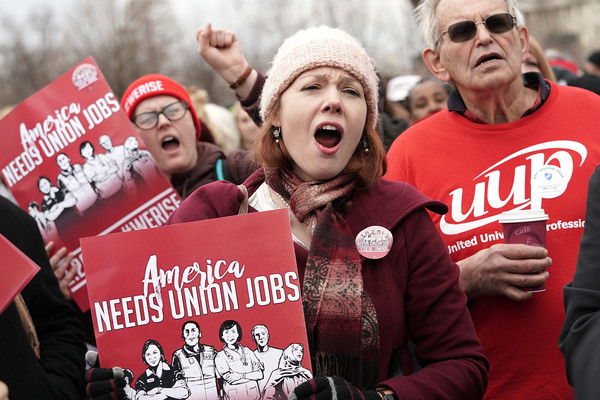Photo Credits: Alex Wong/Getty Images North America
Since the passage of Wisconsin’s Act 10 in 2011, which ended nearly all collective bargaining rights for the state’s public employees, the bosses have taken the offensive against unions across the U.S. and handed them one loss after another. These defeats have included new Right to Work laws in Indiana, Michigan, Wisconsin and West Virginia and potentially Missouri soon. This week marks the latest fight between unions and the state as oral arguments for Janus v AFSCME have begun in the Supreme Court. The safe bet is that unions will take another big hit, unless a major fightback is organized — quickly.
At stake in the Janus case is the primary source of funding for all public sector unions in the U.S.—union dues and so-called “fair share” fees paid by union members. Under current law, a union cannot force a worker to contribute membership dues but it can require that he or she pay a “fair share” fee, ostensibly to cover the cost of bargaining a contract and representing workers.
The bosses, who spent $80 million funding the institutions like the State Policy Network and a network of at least 66 think tanks across the country to spearhead the assault on unions, are fighting to prohibit mandatory “fair share” fees. The right-wing donors and institutes behind the Janus suit claim that this is a question of free speech; workers, they say, should be able to decide whether they want unions to negotiate on their behalf for such things as higher wages or improved benefits and health care.
Needless to say, this is entirely cynical. Employers couldn’t care less about their workers’ “free speech,” but rather wish to attack one of the last bastions — though one already weakened — of union power. The public sector is 34 percent unionized nationwide. This is a relatively strong rate when compared to the paltry 6.5 percent rate in the private sector. The attempt to defeat the public sector unions in one swoop, therefore, has at least three functions: slashing the salaries of all state and federal workers in order to further cut taxes for the rich, placing downward pressure on workers’ salaries across all industries, and finally, serving to launch an attack on the last of the private sector unions.
The Janus offensive against unions is being backed by conservative multi-millionaires like Dick Uihlein, who helped finance the campaign of Wisconsin governor Scott Walker, the architect of the state’s anti-union Act 10 and Right to Work legislation. These laws resulted in a 6 percent drop in union membership in the state and a $10,000 cut in the average teacher’s pay. The effect on the working class rippled outward from the public to the private and workers experienced stagnated wages, reduced benefits, increased ‘flexibility,’ and overall worse conditions throughout. In the country’s 28 right-to-work states, workers are 49 percent more likely to die on the job.
The rebellion by Wisconsin’s workers in 2011 and the impressive strikes by West Virginia’s teachers that have taken place over the past week now show the way to fight against this anti-labor, legalistic assault. Whereas the business-union model of organization — a model whereby the membership is reduced to passive dues payers that receive “services” from the bureaucracy — has brought frequent defeats, victories can be won through militant, organized class struggle, as the West Virginia teachers are trying to demonstrate.
In Wisconsin, hundreds of thousands mobilized and occupied the Capitol in Madison for weeks. The movement radicalized as it grew and even calls for a general strike from a state Federation of Labor were put out. Unfortunately, the cause was betrayed by union leaders and Democratic Party politicians, who successfully diverted the power into an ineffectual recall campaign against Republican governor Scott Walker.
In Right-to-Work West Virginia, the schools of the 55 counties are still illegally on strike even after the union bureaucracy called the end of the stoppage with a 5 percent raise, and little gains in healthcare. They are breaking the law and winning, just as virtually all public sector employees have had to do at one point or another to gain union recognition. Likewise, if and when Janus becomes the law of the land, that’s just another reason for workers to fight — in spite of the laws and leaderships that are arrayed against them. The courts are not the terrain of the working class, but in the workplace and on the streets we stand a chance.
At the same time as we struggle against the rich and the state’s interference in our unions and defend our unions with strikes and mobilizations, we must also fight to democratize our unions and cut the parasitic relation between labor and the Democrats. The Democrats held the House, the Senate and the White House during in the first two years of Obama’s presidency, and did virtually nothing for the working class. There was no push to increase the minimum wage, free trade agreements continued to be negotiated, and a proposal for a public healthcare option was quickly dropped. Still, union leaders refused to learn from their mistakes and contributed $132 million during the 2016 elections to Democratic Party-connected Super PACs alone.
The bureaucrats who lead the country’s largest unions claim that they require dues and fees to represent their workers. But they have failed to organize even a minimal defense of workers’ wages and benefits in recent years. Meanwhile they have continued to take in six-figure salaries, well beyond the average income of the workers whose interests they supposedly represent.
We must fight to defend our unions post-Janus, but we must not have any illusions in the court system, a system which inherently favors employers. Instead, we must carry the fights to our workplaces and to the streets. The Left should call on unions to organize a major campaign against Janus-style attacks, with strikes and direct actions. Indeed, a major reason that the right wing has been able to advance so easily has been the lack of will by the union leadership to fight back.
Historically, American workers have suffered as a result of the two-party political system that is dominated by wealthy politicians in the service of their rich sponsors. It would be a tremendous step forward for the working class to reject bourgeois politics all together and form our own political party, one rooted in class struggle, democratic participation and solidarity. Such a party would fight for a government truly representative of the vast majority, a workers government that puts people over profit.
Union density and the frequency of strikes are at historic lows in this country, a reality that emboldens corporate interests to try and take even more. At the same time, the courageous teachers in West Virginia are showing that workers have power — but we need to use it. The power of organized labor derives not from legal protections passed into law, but through the confidence, solidarity, and political will of workers in struggle. To keep what power the unions still have, and to extend it, we need to clean house of bureaucrats that would much prefer a dinner with politicians to a day on the picket line.











